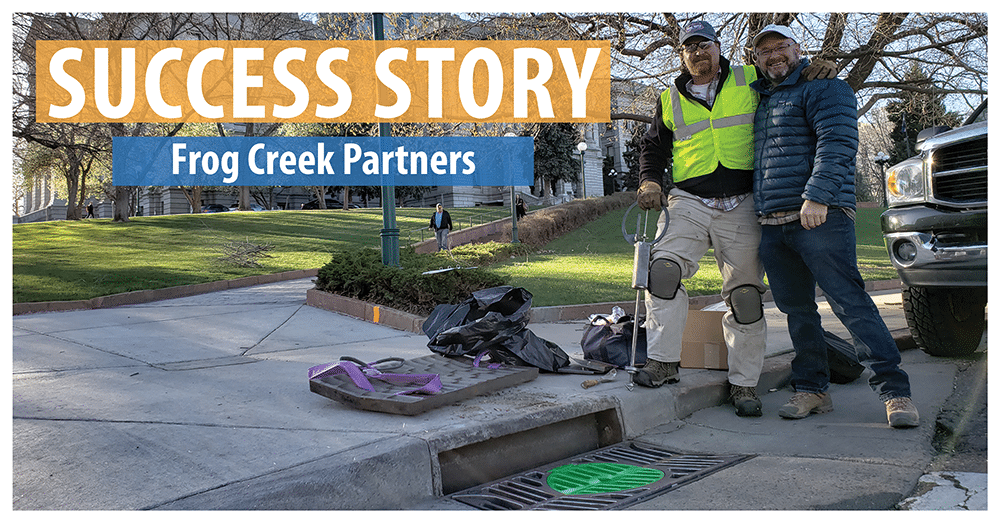Storm water is the number one source of water pollution today. Contrary to what many would assume, most storm water does not get filtered in a wastewater treatment plant, but goes directly into local waterways. In other words, litter from our streets goes directly into local rivers and streams whenever there is a storm.
Casper entrepreneur Brian Deurloo is the founder of Frog Creek Partners, an environmental technology company, and is on a mission to remedy this problem. In 2016, Brian filed a patent for the Gutter Bin® stormwater filtration system, and started the company with Chris Tippie.
Getting Started
In the start-up phase of Frog Creek Partners, Brian took advantage of several Wyoming Small Business Development Center (SBDC) Network services. Business Advisor Cindy Unger helped Brian to develop a detailed business plan which resulted in a financing offer from an angel investor. Wyoming SBDC Network market researchers spent several hours looking into competitors, pricing, and potential customers. Frog Creek Partners then received assistance to register with federal, state, and local government agencies and search for contracting opportunities. Brian has also attended a number of Wyoming SBDC Network training events.
“I started working with the SBDC very early on in the business planning process. They offer a lot of value to budding entrepreneurs by helping guide them in their decision making process, business planning, and training. I would suggest to anybody who is considering entrepreneurship for the first time to reach out to their local SBDC.”
-Brian Deurloo, Frog Creek Partners
How It Works
In an increasingly automated society the Gutter Bin® is refreshingly low tech — but effective — with easy maintenance and quantifiable results. The system removes pollution from water flowing into a drop or curb inlet. The Gutter Bin® consists of a grate and adjustable funnel that directs polluted water into a Mundus Bag® water filter. The bag — along with a Mycelx hydrocarbon capture medium — can remove trash, cigarette butts, sediment, heavy metals, and hydrocarbons from the storm water.
Savings for Cities, Businesses
Frog Creek customers recognize the fact that removing and replacing a filter bag is far less expensive than sending out a $300,000 vacuum truck with two operators to clean a catch basin. The Mundus Bag® does need to be emptied periodically. Experience indicates that a two to four month service interval is sufficient for most environments. Frog Creek offers a Clean and Measure Pollution Service to maintain the Gutter Bins®, or the company will train and certify an internal team to care for an army of Gutter Bins®.
Business Expansion
To date, Frog Creek Partners has over 100 systems in the ground, with Gutter Bins® in Sheridan, Casper, Jackson, and Cheyenne, Wyoming plus Colorado placements at the Denver Zoo, Parker, Colorado Springs, and Vail. In California, Santa Maria, Carpinteria, and Port of Long Beach have also jumped onboard. Most of these initial installations are pilot projects, consisting of 6-20 bins in each location. Many have now been in operation for over 18 months.
In Denver alone, only 12 Gutter Bins® have captured about 2,500 pounds of pollution in just one year. To give you an idea of potential scale, Denver has 22,000 storm drains in the downtown area alone and this pollution rate equates to over 4 million pounds of debris being flushed to the South Platte River each year — this does not include the suburbs of Denver.
Just one cigarette butt placed into a liter of water with 10 minnows will kill half the fish in four days — and more than four trillion cigarette butts are littered annually (source). Equally concerning is that plastic in the ocean is projected to outweigh the fish by 2050 (source).
Custom Branding
An added benefit of the Gutter Bins® is the fact that Frog Creek Partners can supply custom logo grates. These are very attractive and can be great advertising for a company working in conjunction with a municipality on a public/private sponsorship basis. They can also be located at a company facility to raise public awareness of storm water pollution.






